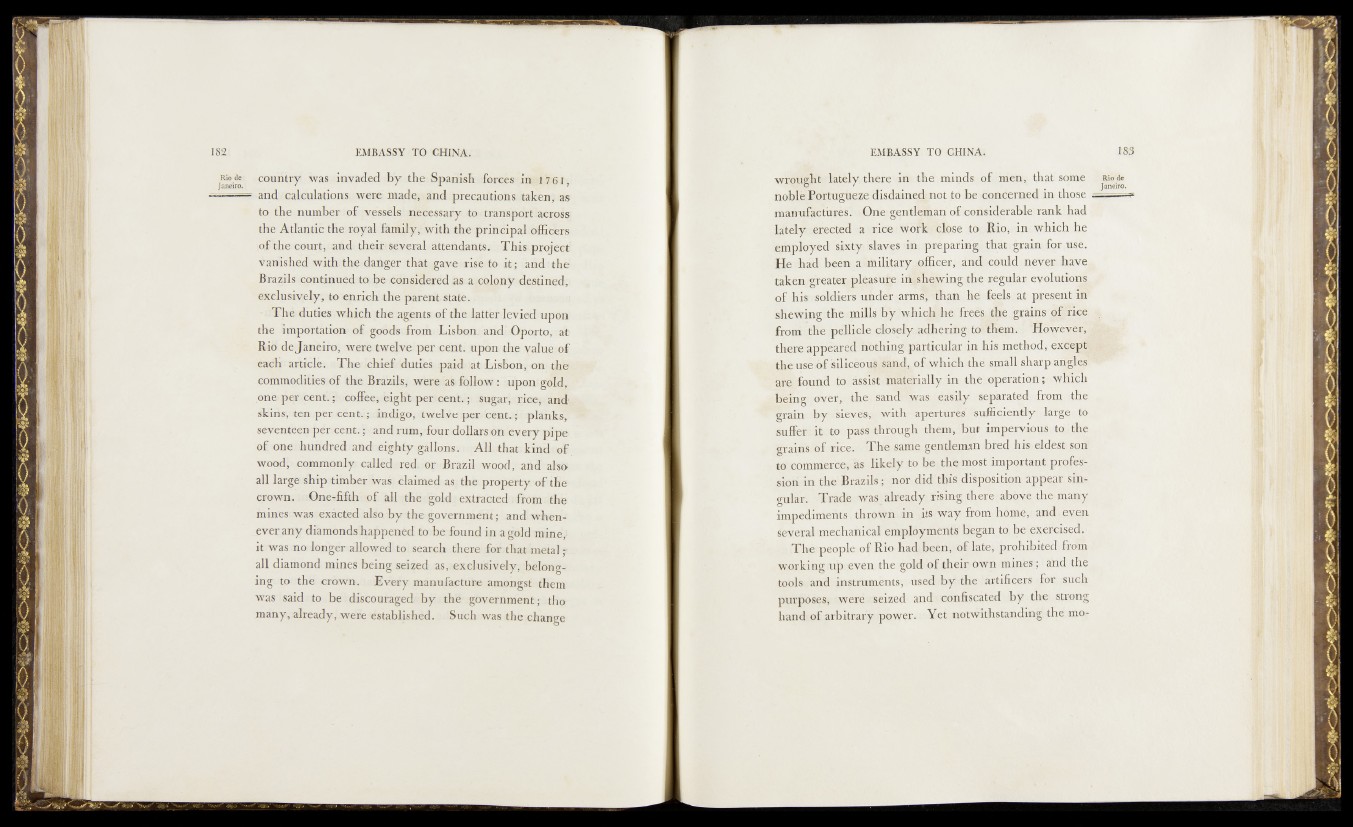
M© de
Janeiro* , country \v.as ^invaded by:theil>pariish dorces dn* 'tfoj r ,
-ahd^ oaf chlationsy were: made* and preoautionstakenv as
to the . numbers of'vessels! nteeessany tto transportiacross
the Atlantic theroyal family, with the primbpahoflidbrs
■.of the courtl * add; theirtseveraLattendants. Thisiprojeef
^ ^ sh ed withrthe*daA@er that gave arise* to it? and the
Brazils .continued^ be considered as, a^iony-.^WNiiled^
exclusiyelyr,; to .enrich the parent, state.I
- The duties which the agents? of the latterleviddiupon
the importation of goods-from -Lisb®n.uand Oporto, at
Bidde Janeiro, were twelve per cent, upon the yalua of
each article. Tlie ichief:duties. paid >at Lisbon, on; the
eomm©ditiea:df ibhe Brazils,* wereas-follow: upon .gold,
one* per cent.; ocnffee^bight pert cent.sagari rice* •* and*
skins, ten per ®4»&i$ indigo, twelve per‘c en t;; planks,
seventeenpersoent; and ram,/fburdoMars®nleverypipe
of: one hundred and eighty gallons* I. All that- kind ? #
wood, commonly called red. or Brazil wood,' and' alsol
all large ship timber iwas claimed as; this property dfriS#
crowin. 1 s OneTfifthr of all thc gold ;extracted »from. the
mines;was;exaetedalSobythe.gQv:eTnmeiit;.andwhen-
jBYer$j% diamondshappened tb/be h)und in a gold mine/
it wasmodanger allowed; to; search there forAhacimetal f
all diamond mines being seized as,. exclusively,* belong-»
ingiTo the crown.£* Every manufacture amongst them
was said ; to . be a discouraged , by the government; ,tho
many,already* were established. | .-Such was the,change
wr quight‘rlatelptkar.e'dm the mipdsonfnirien^fhateijsc^me
nobreEoEfengueze.disdainedjsnot jfco be donierned jin those.
manufactures.' On,ergint'®^ian ofitgbrisiderablej’irank had
latelyhereefeed sa<'.j:ric^f0on^ejl§se to* JR.io,< ins which;he
epiployed* &kiytislav<®S'bh: -preparin that^gtainufor ,us,e.
He hjjtJ£been a f e i l i t o y ^ S d ^ andi?6pnld*inev^haf^
takem^eate»leasia& inMn^ing th^a^galaB evolutions
of hisf^soldiels uhdejr armipllian h^sfeghjiate.pjF^iijt in1'
shewingTfaln.e!qndls feyJwhiGhfdie.fefedthe -,Stains d^rice
from yMe^#llielet©fbsefyuadherinjg>^ofm,em. ’
dnf,T^ p p^T5^d^^t|^.g^kriiGular u@.hypnc|vlife)(h cxc?tiM
t'ke:ns.er@C ^ili®eonvsap(Lbb>\hi,^uthe small sharp a i# ‘e^
ar&fomnd t^k^^Tmva^iail^: in th^jopgratioii; wffich
beingyover, th e^ ^ n ^ ^ ^ ^ e a sily a^epatatpd,'from «the
grain b^sfev^s^ withf-apertures’, ''suffi cientliy rtbffgqt to
suffer, it^tp.pass through tfeny,. but' im p e^M ^ ta .
grains, of The same gentleuim bn d.his:; eldest? so#
theommer’ce,-Chs Iike^tobe^thqimos i uupmi i n t p r « ^
siori. in the? Brazils; mpf did'tl}k dhpositicfOi^ppey^singular.
Trade -was,: already rising yhexe'f.llo^e. they maroty
impediments throwpdn fts Y*a^%omdhfme-,f attjd^eyen
spveral mechanical employments* began tOib^xcAiiscdo
Tlvefpeople of* Rio had» been ohlpta^ipuddbUtd:: fuftn
workingmpeven the gold of the^o^|i'!mmhsi;..^ad the
tools and instruments, used byithefarfihee^s djor^'.such
purposes, Were jg seizedi’an^^edp-fiscated ,iby strong
handx# arbitrary power. isYief^notwithstandipgt'the mpt
Rio de
Janeiro.